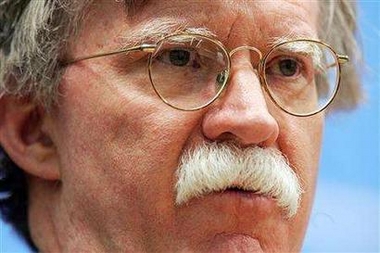|
US: India, Pakistan got atomic arms 'legitimately'
(Reuters)
Updated: 2006-03-02 11:39
The US Ambassador to the United Nations John Bolton said on Wednesday the way
India and Pakistan had obtained nuclear arms was legitimate, in contrast to Iran
which he accused of pursuing atomic weapons in violation of its international
undertakings.

US Ambassador to the United Nations John
Bolton speaks to an audience in New York February 25, 2006. Bolton said on
Wednesday the way India and Pakistan had obtained nuclear arms was
legitimate, in contrast to Iran which he accused of pursuing atomic
weapons in violation of its international undertakings.
[Reuters] |
While Iran is seeking to conceal development of nuclear weapons under the
guise of a legitimate program to generate nuclear power, Bolton said, India and
Pakistan "did it legitimately."
His comments, made in response to an audience question following a speech to
a meeting of the World Jewish Congress, appeared to go farther than the
administration of President George W. Bush has previously gone in embracing the
two nations' nuclear programs.
They also coincide with a visit by Bush to India in which the United States
is offering New Delhi de facto recognition of its nuclear arms program. Bush is
due to travel to Pakistan from India.
The United States imposed punitive sanctions on India after it tested a
nuclear bomb in 1998. In the same year, the U.N. Security Council unanimously
passed a resolution condemning India and Pakistan for their nuclear weapons
tests.
Under a deal India and the United States agreed in principle in July 2005,
New Delhi would commit itself to certain international nonproliferation
standards including putting its civilian nuclear facilities under international
inspection.
In return it would gain access to U.S. civilian nuclear technology, including
fuel and reactors, that it was denied for 30 years. India's military facilities
would not be subject to inspections under the deal.
At the same time, the U.S. administration is pressing Iran to turn its back
on a program to enrich uranium on its own soil, a plan Tehran insists is
intended only to produce electric power but which Washington insists aims to
develop nuclear bombs.
Bolton noted that neither India nor Pakistan had ever signed the nuclear
Non-Proliferation Treaty, intended to contain the spread of atomic arms, while
Iran had done so.
"I give them (India and Pakistan) credit at least that what they did was
consistent with the obligations they undertook," Bolton said.
"They never pretended that they had given up the pursuit of nuclear weapons.
They never tried to tie what they were doing under a cloak of international
legitimacy. They did it openly and they did it legitimately," he said.
The 1998 Security Council resolution called on India and Pakistan to stop all
nuclear development programs immediately and urged other states to stop selling
either country equipment that could be used in atomic arms.
|